Introduction
This article offers the benefits and ways of practicing kindness within organizations and teams.
People deserve and expect kindness. It’s human nature.
Whether it’s at work or home (or in any other place).
Kindness makes all the difference between a workplace people want to join and one that gets a bad rep on Glassdoor.
The culture within teams, the well-being of its people, and even the quality of work produced take a hit in the absence of kindness.
And so, consciously practicing kindness is non-negotiable for long-term success.
What Does Kindness Mean?
Kindness is acting from a state of mind where one wants what's best for others—with empathy, consideration, and much humility—without expecting favors in return.
(Quid pro quo exchanges don't count as being kind.)
When one chooses to be kind, they let go of their ego, envy, and selfish behavioral and thought patterns.
Kindness is often confused with being nice, rooted in a yearning to be liked and accepted by others.
One can continue to be nice and not care about others' well-being or growth.
And even granting people what's rightfully theirs, like letting teammates go on leave.
What Does The Opposite Of Kindness Look Like At Work?
The opposite of kindness at work looks like fear, insecurity, and heaps of self-centeredness.
Scenario 1:
Here's a recent incident that an acquaintance faced at a reputed company.
A woman came down with a fever at work. It was 11:30 AM, and she decided to soldier on and take half a day off.
At 1:30 PM, she requested leave from her manager.
Manager: "Have you finished today's assignment yet?"
Woman: "No, I started it this morning. But I'm almost done."
Manager: "Good, then it won't take much time. Please finish the assignment and then take the leave."
Scenario 2:
A virtual meeting room in one of the biggest global IT giants.
I heard the feeble voice of a man (possibly over 40 years old)—speaking directly from the hospital bed—in a scrum meeting. The man had suffered a heart attack the day before.
If this wasn't enough, someone had the gall to ask when he would "tentatively" be able to rejoin work.
When people don't practice kindness within teams, it creates a culture of viewing human beings as little more than mere resources.

The Importance Of Kindness In The Workplace
The practice of kindness can help create emotionally mature organizations.
By transforming its team members, right from the top.
According to the American Public Health Association, practicing kindness can:
- Improve one's mood and self-esteem
- Boost immune system
- Lower blood pressure
- Relieve anxiety by increasing the body's release of feel-good chemicals, like dopamine and endorphins
Studies show that it also brings happiness and a sense of meaning to people's lives.
At an organizational level, research indicates that acts of kindness can be linked to higher productivity, efficiency, and lower attrition rates.
These are precisely the results that leaders want in their organizations.
Boosts Team Morale
Kindness is a powerful morale booster, especially during high-intensity work.
Showing kindness, for instance, by appreciating and recognizing the small efforts that usually go unnoticed and taken for granted, strengthens team bonding.
When teammates (especially leaders) show kindness in their interactions, it inspires people to do better, resulting in high-quality work that people can be proud of.
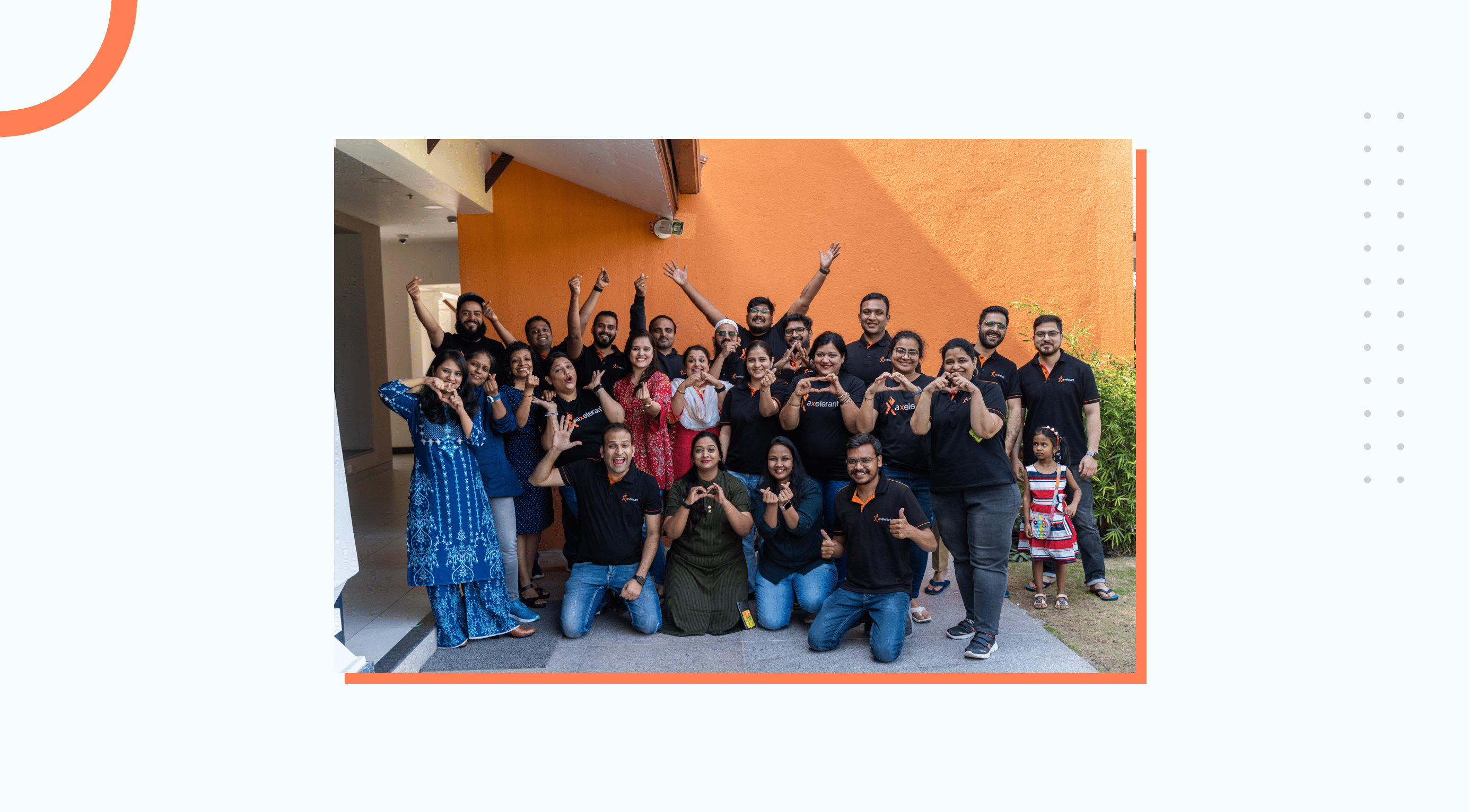
Creates And Sustains Psychologically Safe Spaces
When people in an organization consciously practice kindness, it creates a psychologically safe space.
Team members feel secure in voicing their opinions, taking calculated risks, and exploring innovative solutions.
Feelings of fear, ridicule, and negative consequences gradually decrease.
People also feel empowered to provide honest feedback and challenge the status quo to remove harmful or defunct practices.
Fosters Fearless Creativity
A by-product of knowing the existence of kindness in one's team and having a psychologically safe environment is fearless creativity.
Because the fear of judgment—or any kind, for that matter—stifles creativity.
Fear acts as a barrier to the free expression of ideas and originality.
People run and chase what they are told to and avoid speaking up for fear of consequences.
It can cost an organization dearly, as they get stuck in a rut, doing the same things repeatedly and expecting better results.
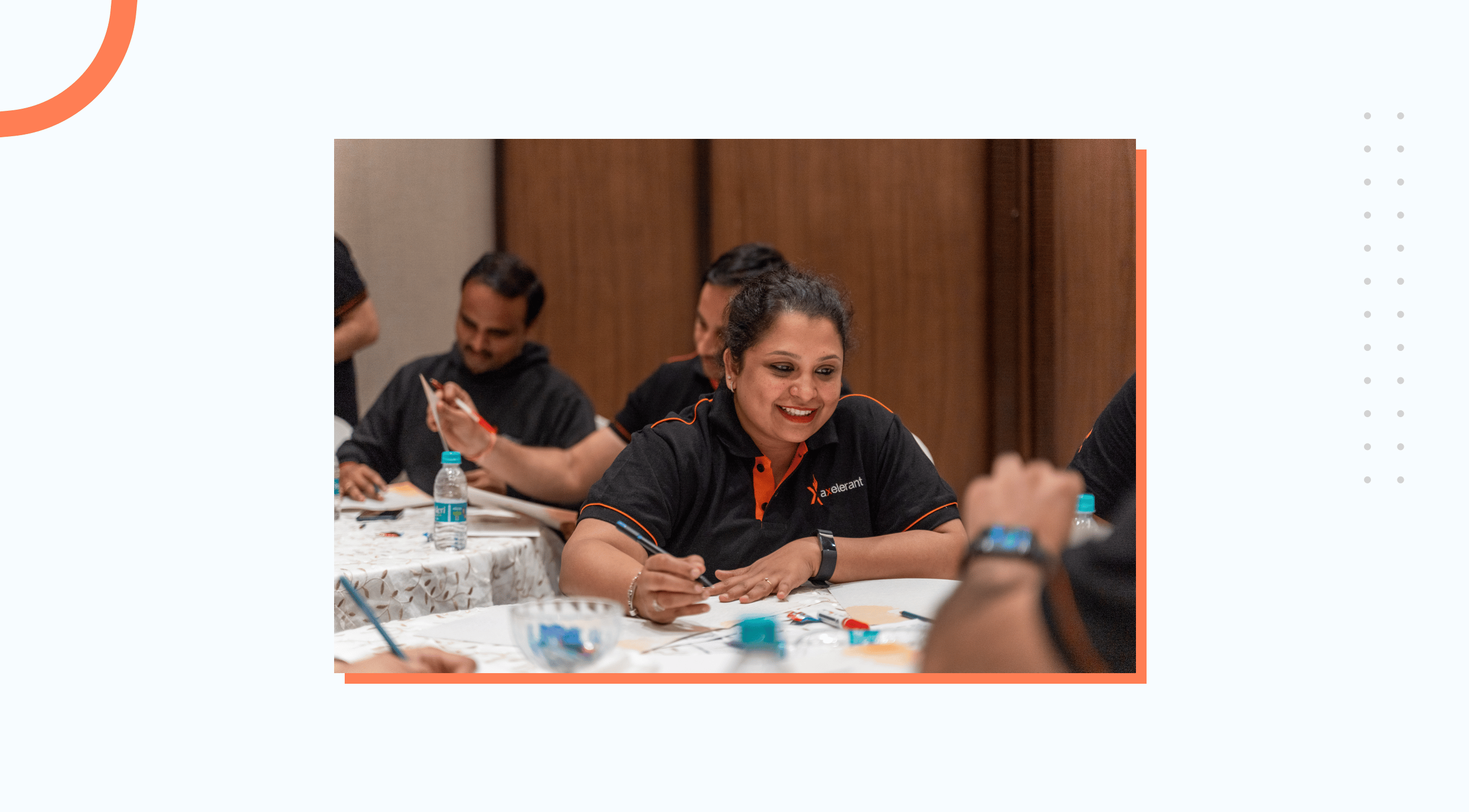
Enables Smooth, Frictionless Collaborations
We've all had the "fortune" of conversing with unkind people.
Imagine that as the norm in the workplace.
A single insensitive person is enough to muddy the collaborative spirit of a team—especially when they are in a leadership position or are protected by someone in a leadership position.
When team members are consciously kind to each other, everyone feels supported and seen.
Conversations happen organically and smoothly.
Without friction or constantly walking over eggshells.
Even when the stakes are high and deadlines near, a kind and collaborative team spirit is a buffer against stress.

Builds Loyalty And Reduces Attrition
People are likelier to stay in organizations where leaders prioritize kindness.
It builds a strong loyalty when people feel treated fairly and respectfully—core components of kind behaviors at work.
Finding the right people takes much effort and resources, especially for an organization like Axelerant, where culture is paramount.
Many organizations also invest in role-specific training right from onboarding.
For instance, Axelerant's annual education benefit lets people upskill through professional courses.
When they leave abruptly, all that resource and training is wasted.
Practicing kindness is an investment in reducing attrition and building organizational loyalty.
How To Practice Kindness In The Workplace?
Even with the right intention, people often need help figuring out how to start being kind at work.
Treat others as they would like to be treated themselves.
Here are some examples of kindness in the workplace that can help one start their kindness journey at work, and in life.
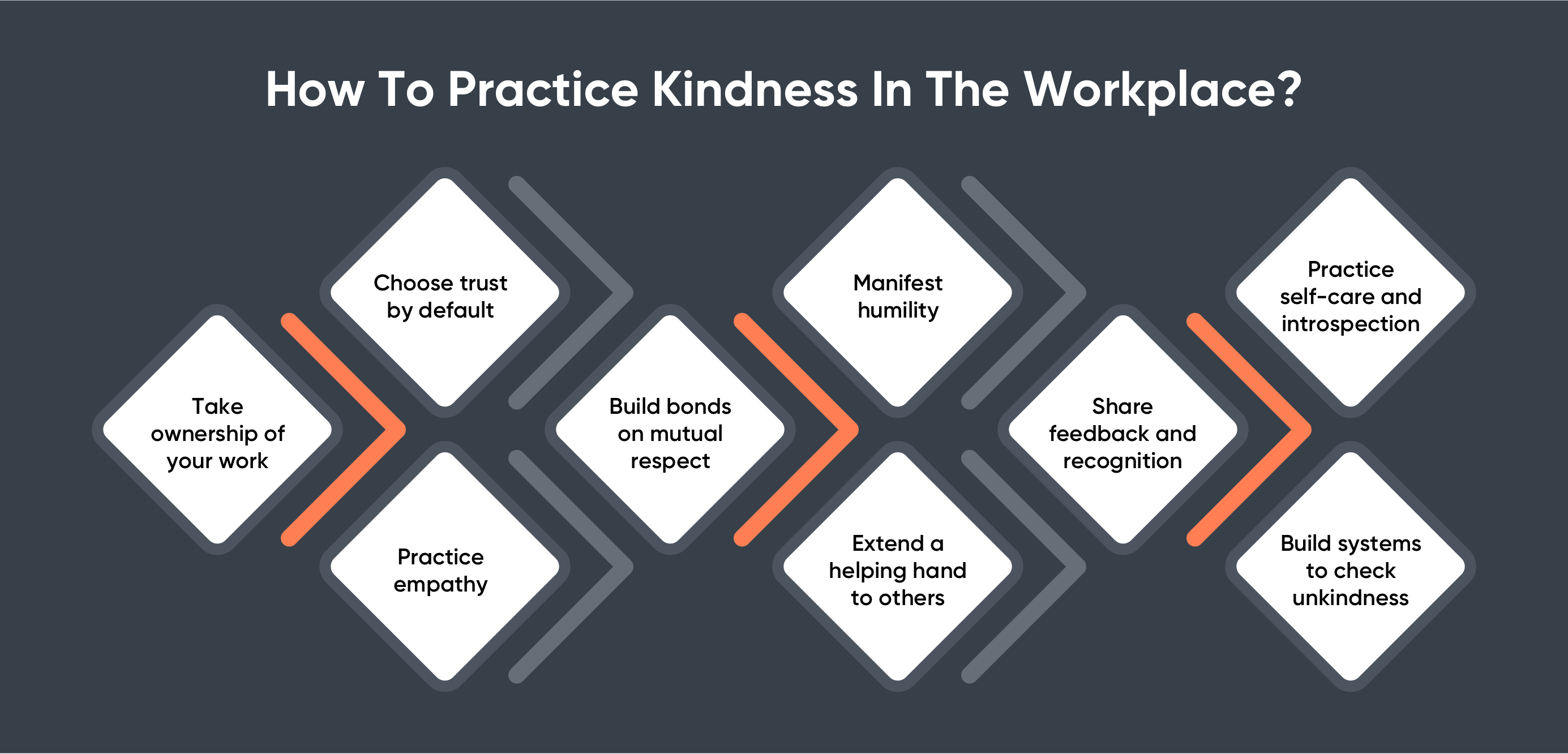
Ownership Of Work
Work ownership is an integral part of practicing kindness within a team—because it lays the foundation for people to be kind.
It requires embracing work with a sense of responsibility beyond mere task completion.
When people own their part, end to end, they give others the freedom to do their best work.
This lightens the workload and creates an atmosphere of reliability and trust.
The burden of success gets distributed organically, too.
It becomes easier for people to trust that their teammates are putting in their best effort.
People don't just feel accountable for their tasks but are deeply connected to the team's wins.

Choosing Trust By Default
Trust is foundational to practicing kindness at work or in any group.
The general wisdom about trust is that it needs to be earned. Through sweat, toil, and steadfast dedication.
And so, professional relationships often begin erring on caution and suspicion.
Breeding distrust of people's motives and abilities.
And distrust makes teammates do unkind things—questioning each other cynically and jumping to conclusions at first chance.
Always assume positive—or neutral—motives, even in challenging situations.
And have faith that your team members can work through a problem and produce great work.
This practice is an intentional choice and takes effort to cultivate.
It creates a workplace culture where trust is not "earned" but freely given.
A culture that values the inherent goodness in every team member.
Practicing Empathy
Empathy can bring authenticity and understanding into workplace relationships.
Being empathetic to others' problems or experiences helps us relate to them and, in turn, allows us to be kind.
Empathy involves putting oneself in someone else's shoes and creating a safe space where they feel heard and validated.
For example, one of your colleagues might need help adapting to the new work environment after joining.
Recollecting your own experiences of being a new joiner and empathizing from that mind space would allow you to understand their situation and help them better.
Empathy helps us see team members as fellow humans navigating the complexities of professional life—just like us.

Building Bonds On Mutual Respect
The link between respect and kindness is quite obvious.
Seeing and respecting team members as human beings is a must for one to be kind.
But it doesn't stop there.
People must realize that each team member's work is valuable and deserves respect. The team needs their contributions to reach its goals effectively and qualitatively.
Plus, it boosts a sense of pride, confidence, and ownership when there's mutual respect in a team.
Manifesting Humility
Being humble is harder than it sounds.
Even when someone praises one for being humble, one's humility takes a dip momentarily. Sneaky business.
When team members are humble, they leave their arrogance and ego out of conversations.
They don't need to assert dominance to make themselves feel important.
They don't feel that the organization, and all its people, revolve around them.
Humble people freely acknowledge their mistakes, opening them up to learning and growth. And more approachable, too—because we all goof up.
Humility allows one to take constructive feedback without considering it a personal attack. It makes the workplace so much better and kinder.
Extending A Helping Hand To Others
Helping others is one of the best examples of practicing kindness.
It forces one to truly see their team members, go beyond the pigeonhole view of finishing one task after another.
A team wouldn't feel much like a team if nobody bothered to notice and extend a helping hand to those who needed it.
Here are some things you can do to make your colleagues feel cared for, looked after, and seen:
- Offer to shoulder a part of their workload, or help streamline their process if someone seems swamped with tasks
- Share ideas about creative tasks if you feel someone is feeling stuck
- Organize a mini-workshop or a casual skill-sharing session
- Remind people to have food on time; bring them something from the canteen if deadlines keep them glued to the chair
- Be adaptable in your collaboration approach
You may not be able to extend help during the rush-hour frenzies. But reaching out whenever you can is a good start.
Sharing Feedback And Recognition
When done simultaneously in a healthy balance, feedback and recognition foster kindness.
I don't mean feedback shared immaturely that shatters the receiver's confidence.
Feedback that is specific, kind, and coming from a space of helping others improve and grow.
That's what we practice here at Axelerant. When in doubt, people reach out to their coach to share feedback that adheres to a positive intention and our core values.
And recognition should always be given in the open.

Self-Care And Introspection
Without self-care and introspection, even the kindest of people can become perfect monsters, making others' lives as miserable as theirs.
Being kind to others is tough when one isn't kind to themselves.
It involves taking care of one's well-being.
Keeping emotionally, mentally, and physically fit. Learning to manage stress and navigate life's complexities.
Everyone struggles with some aspects of life that make it harder to be kind to others.
It could be sticking to a routine for someone, and being spontaneous for the other.
That's why self-care and kindness practice has to combine with introspection. If possible, daily.
To realize where one stands with oneself and others in the kindness quotient. And change where it's needed.
Building Systems To Check Unkindness
A culture of kindness is hard to create and harder to maintain.
It demands effective, well-thought-out, and evolving systems to check unkind behaviors.
To make this a reality, organizations should:
- Implement clear policies against hurtful behavior
- Establish seamless conflict resolution mechanisms
- Foster a culture intolerant of disrespect
- Provide training and coaching for practicing kindness
And build in periodic check-ins to address concerns promptly.
Start Your Kindness Journey Today
Work doesn't need to be a dreadful, prickly place packed with friction.
It can be energizing and rewarding when teammates practice kindness consciously.
And a practice lies in action.
Start being kind to yourself and the people around you at work (and outside of it). Take one small step daily.
It's time we strive to create kinder workplaces—because everyone deserves kindness.


Rohit Ganguly, Content Marketer
Rohit is a content marketer first and a YouTuber second. He loves to interact with animals, feed them, clean his apartment, and spend time with friends and family. Curious by nature, he also enjoys literature, movies, meditation, and calligraphy.
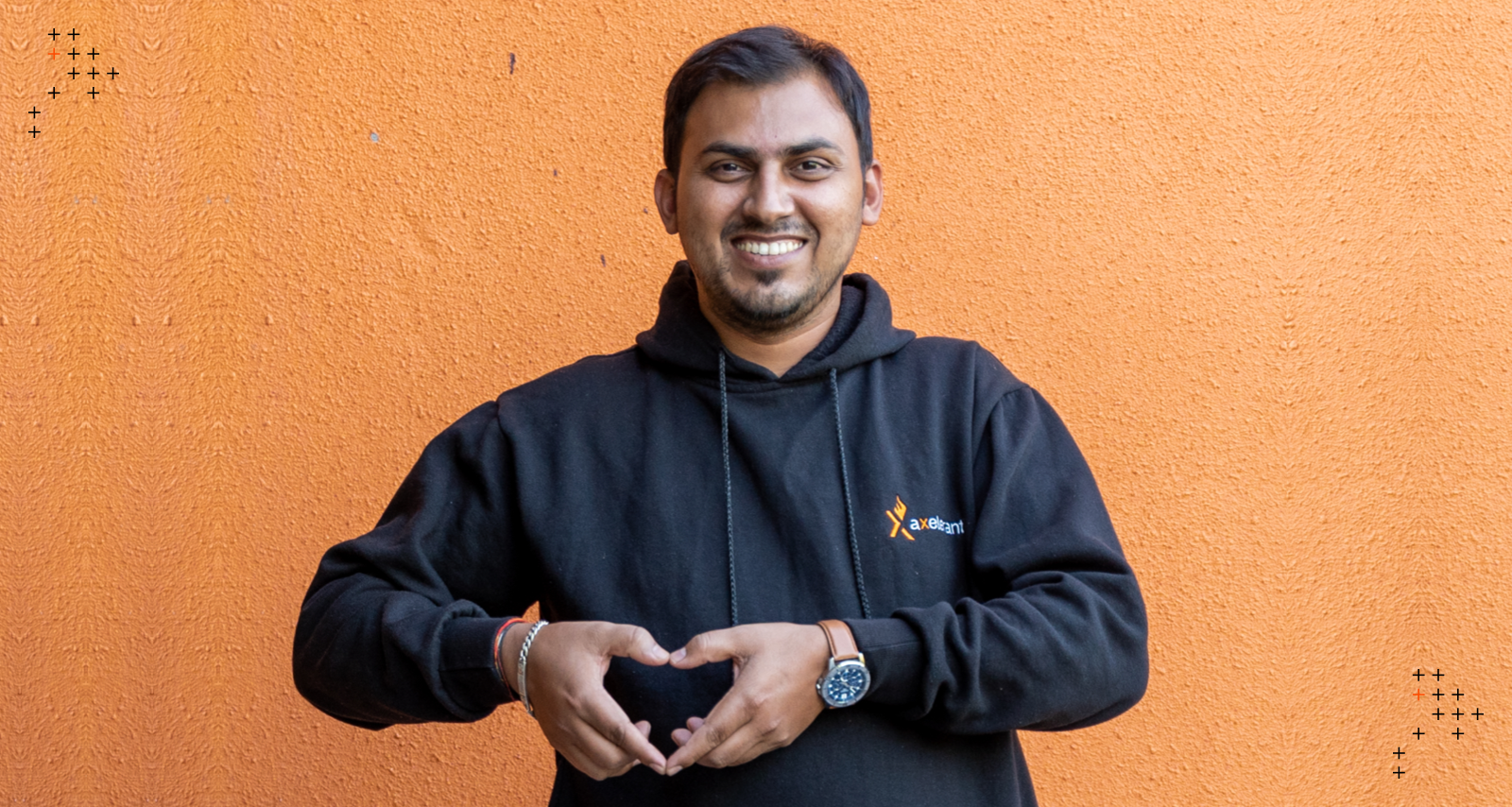
 We respect your privacy. Your information is safe.
We respect your privacy. Your information is safe.

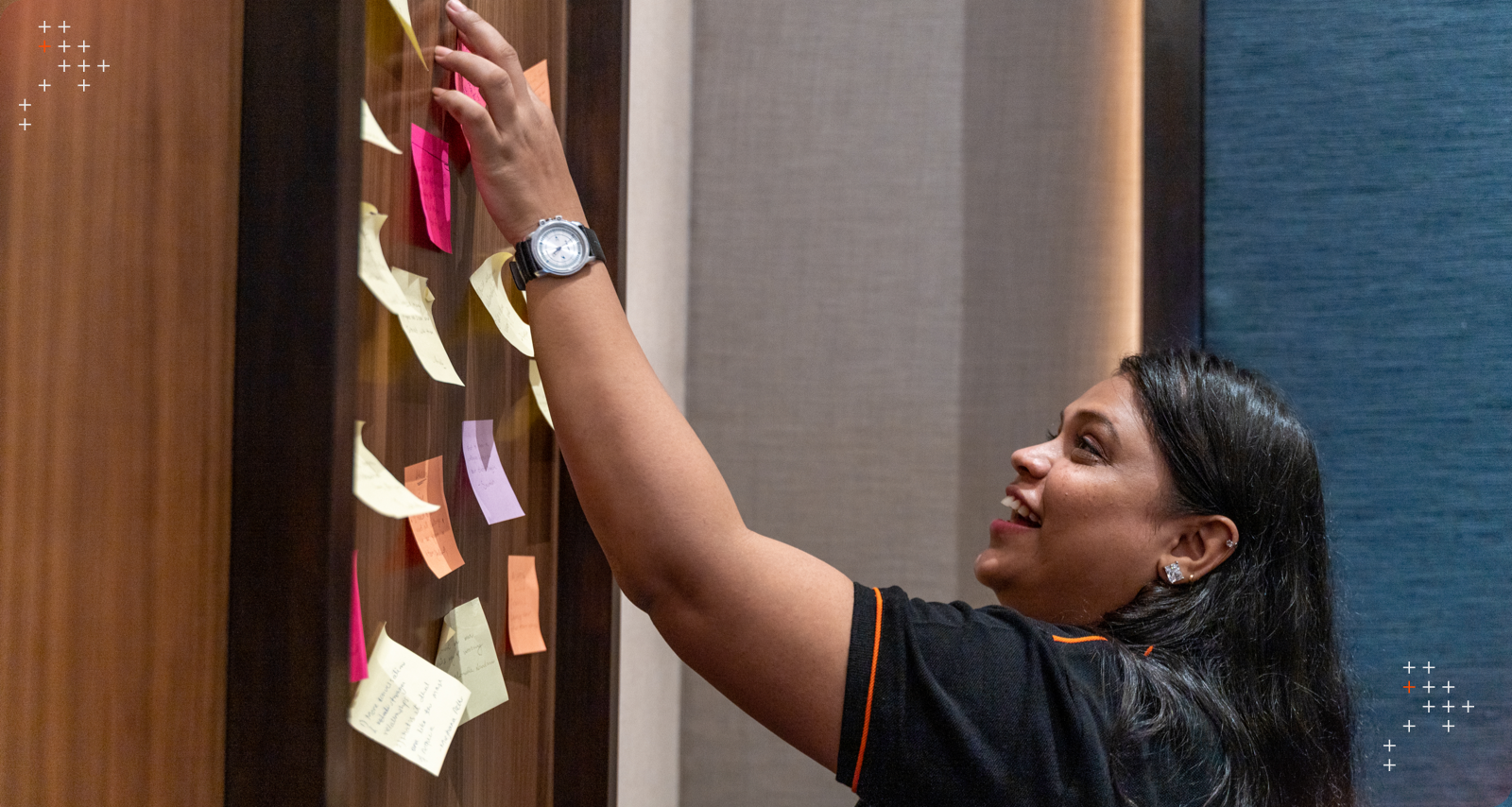

Leave us a comment